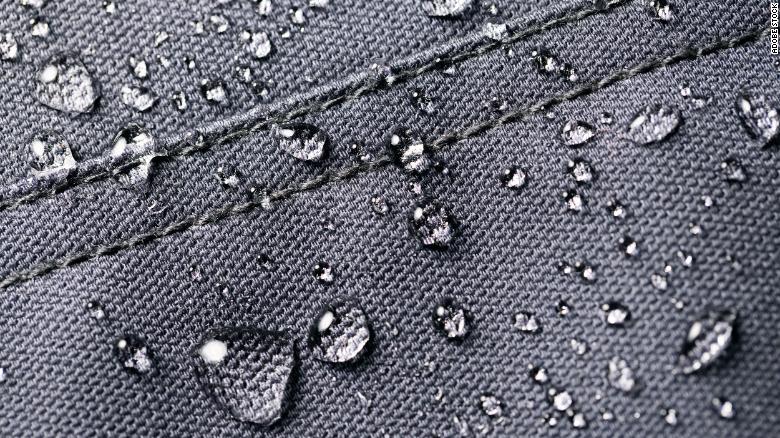Mexico City says goodbye to single-use plastics 1:08
(CNN) --
Many of the water- and stain-resistant furniture and clothing we buy may contain toxic "forever" chemicals called perfluoroalkyl and polyfluoroalkyl substances (PFAS), which are linked to numerous health problems, including liver and heart damage, immune disorders, cancer and hormonal disturbances, according to a new report.
Independent laboratories commissioned by Toxic-Free Future, an environmental and health research and advocacy group, conducted chemical tests on 60 products in three categories: outdoor apparel, bedding, tablecloths and napkins, purchased in 10 big retailers.
All of the products tested by Toxic-Free Future were imported from Asian countries and sold in the United States and on the Internet, according to the report.
"We detected PFAS in a wide variety of products including raincoats, hiking pants, shirts, mattress pads, comforters, tablecloths and napkins," said co-author Erika Schreder, chief science officer for Toxic-Free Future.
The report, Toxic Convenience: The hidden costs of forever chemicals in stain- and water-resistant products, was released Wednesday.
Water and stain resistant products contain toxic plastics.
Man-made perfluoroalkyl and polyfluoroalkyl chemicals, or PFASs, are made up of a chain of linked carbon and fluorine atoms that do not break down in the environment.
These chemicals have been detected in the blood of 99% of Americans, according to a 2015 report from the US Centers for Disease Control and Prevention (CDC).
advertising
Thousands of varieties of PFAS are used in many of the products we buy, such as nonstick cookware, infection-resistant surgical gowns and drapes, mobile phones, semiconductors, commercial aircraft, and low-emission vehicles.
Chemicals are also used to make carpets, clothing, furniture, and food containers resistant to stains, water, and grease damage.
Once treated, according to the report, textiles emit PFAS throughout their useful life, escaping into the air and water of homes and communities.
Still, the report does have some good news for consumers, Schreder said.
"We have not found PFAS in any of the items that are not marketed as stain resistant or water resistant," Schreder said.
"Consumers can pick those to be safe."
Raincoats, of course, are a different story, because consumers need them to repel rain.
But there is hope here, too, Schreder added.
To achieve the goal of repelling water, some companies are using tighter weaves, PFAS-free membranes between coat layers, and "paraffin wax, which is the only coating that has been publicly evaluated and found to be safer."
World Oceans Day: when you wash your clothes you pour plastics into the ocean
Banned PFAS are still found
In the last decade, US chemical manufacturers have voluntarily stopped producing two well-studied PFASs that have been linked to cancer, heart disease, immune and endocrine disorders, etc.: perfluorooctanoic acid (PFOA), from eight carbons, and perfluorooctane sulfonate (PFOS).
However, testing by Toxic-Free Future found that 74% of imported products still contained the older PFAS chemicals.
"I was alarmed that the oldest and longest chains of PFAS, which the industry claims have already been phased out, were found in these imported products," said Melanie Benesh, legislative and regulatory attorney for the Environmental Working Group (EWG), an advocacy group without a for-profit organization dedicated to reforming chemical safety and agricultural laws Neither Benesh nor the EWG participated in the report.
A spokesman for the American Chemistry Council, an industry trade organization, told CNN that the importation could explain why "remnant chemicals that have been phased out were identified and could indicate a greater need for control over imported products."
Microplastic contamination does not stop 1:12
New chemicals found
The report says product testing also found a number of new PFAS chemicals created by industry to replace PFOA and PFOS.
Experts say the newer versions, which simply replace the eight-carbon chain with four- or six-carbon chains, appear to have many of the same dangerous health effects as the older chemicals.
Therefore, according to experts, consumers and the environment remain in danger.
"They went to the shorter-chain carbons, and you study them, and they do pretty much the same thing," microbiologist Linda Birnbaum, former director of the National Institute of Environmental Health Sciences and the National Toxicology Program, told CNN in an earlier interview. .
Fast food wrappers and takeout containers may contain toxic chemicals, study warns
"Some call it the 'Whac-a-Mole' problem. Others call it the chemical conveyor belt," Birnbaum said.
"Why do we think that you can make a very small change to a molecule that is being made and the body would not react in the same way?"
The American Chemistry Council disagreed with the report's conclusions, stating that not all PFAS are created equal and should not be regulated in the same way.
"Lumping all PFAS together as if they were the same is inconsistent with conventional science," Tom Flanagin, director of product communications for the American Chemistry Council, said in an email.
"Consumers should be wary of reports that use flawed assumptions not supported by science."
Good news for consumers
According to experts, there are more and more options for consumers to avoid clothing and other products with PFAS.
One of the most effective is to make informed decisions first.
"The easiest thing for a consumer to do is not to buy things that are marketed as stain and water resistant," said EWG's Benesh.
"When it comes to clothing that you want to be more waterproof, I think you'd have to do some research with the vendor to see which products are actually PFAS-free."
There are lists of companies that are PFAS-free or at least in the process of doing so, according to experts.
The Environmental Working Group has compiled a list of companies that have not intentionally added PFAS to their products.
Consumers can also view the list of GreenScreen certified products, which is a "globally recognized tool designed to assess and compare chemicals based on their hazardousness," says Shari Franjevic, director of the GreenScreen program at Clean Production Action, a organization dedicated to evaluating green chemicals, sustainable materials, and environmentally preferable products.
"The core value of GreenScreen is that it takes really complex toxicology and boils it down to a score between one and four for harm (four being the safest). That allows people to put chemicals on a continuum and say: 'Okay, this is safer than that,' and start selecting safer chemicals for your products."
Switch to natural cleaning products
However, labels may need to be read.
This is because not all of a company's products may be free of toxic chemicals, while remnant products that are being phased out may still be on store shelves.
Reading the label can be more difficult than you think, considering the alphabet soup used to name the different PFAS chemicals.
These are just some of them:
PFBA
PFPeA
PFHxA
PFUdA
PFDoA
PFTrDA
PFHpA
PFTeDA
PFNA
PFDA
PFHxDA
PFODA
This list does not include the two legacy chemicals that are in the process of being phased out: PFOA and PFOS.
"The most common way to mislead companies is to say they don't contain PFOA, even though other PFASs have been used in the product," says Scott Faber, EWG Senior Vice President of Government Affairs.
Going to the trouble of research is worth it, GreenScreen's Franjevic said, because there are many other problematic chemicals in our lives besides PFAS.
“One of the things we try to educate the public is that just because it doesn't contain PFAS doesn't mean it's safer,” Franjevic said.
"We're really encouraging people to understand that they want products without PFAS and what we call 'preferred chemistry,' meaning products made without other carcinogens or mutagens or toxins that affect reproduction."
plastics






